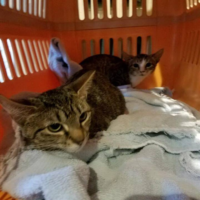Rescue a Pet

Some believe that pets in shelters are there because they have behavioral problems. The sad truth is that most of these animals are where they are due to their previous guardians’ ignorance and indifference. Often, people who have acquired pets from shelters and pounds are pleasantly surprised at the wonderful companions they have acquired. Animals with serious and obvious behavioral problems are not put up for adoption. Remember, many excellent animals waiting to be adopted will exhibit minor behavioral problems. Some are scared while others are excited. This should not be held against them as they are in a stressful environment.
While most of the pets in shelters and pounds are mature animals, there are also puppies and kittens available for adoption. The saying “You cannot teach an old dog new tricks” is false. Shelter animals respond well to good, effective and humane training techniques. When training your pet it is important to be consistent, patient and understanding.
Some people mistakenly believe that purebred pets are superior to animals of mixed breeding. Purebred dogs and cats are not smarter, healthier or more even-tempered than canines and felines of mixed breeding. In fact, due to natural selection, the opposite is often true; mixed breed pets may be hardier.
If you want a purebred pet you should visit your local animal shelter or pound. There was a time when purebred dogs were seldom found in these facilities. Unfortunately, due to mass breeding, purebred dogs are common and more are being surrendered to animal shelters and pounds.
If you desire a particular breed because you like the character that breed displays, why not visit your local animal shelter or pound and adopt a pet with the characteristics that you are looking for?
Often a pet of mixed breeding has a disposition and character similar to the breeds that were responsible for his/her creation. Another good resource is www.petfindes.com. If you are a first time dog owner, think long and hard about how much time you are willing to train, exercise and devote to your new pet. Be clear about the type of coat, size, exercise requirements and temperament that you consider ideal. Many previous pet owners failed to do so which is how some of these animals are now in this horrible situation. Ignorance is not bliss!
Benefits of Rescuing a Pet
There are numerous benefits with providing a good home to a pet who needs it. One obvious benefit is the rewarding experience associated with saving an animal’s life. This good act is returned several times over by the loving and devoted nature of the canine or feline family member who improves the lives of his/her guardians by providing companionship, loyalty and love – to name but three things. Other benefits of adopting a dog or cat in need of a good home include:
The cost of adopting a pet at an animal shelter is usually inexpensive compared to buying one from a breeder or pet store. Often animals adopted from shelters have already been neutered or there is some economic incentive to have the animal neutered. Most of these animals have also been wormed and vaccinated.
Adopting a companion animal from a shelter means you are helping, and not contributing to, the pet overpopulation problem.
Adopting a mature dog or cat means that you do not have to go through the demanding stage of raising a puppy or kitten.
With a mature pet you have a good idea of the animal’s temperament and you know the animal’s adult size, hair coat etc.
Mature pets are often house-trained (although some mistakes will likely occur until the animal is used to his/her new family, home and routine) and may even have some basic training.
Providing the animals get along, an adopted pet can be good company for other pets.
Shelter animals have beautiful temperaments and want to please their new guardians.
While there are many benefits to adopting a rescued pet, there may be a minor concern or two. Depending on how the animal has been treated, he/she may require a little more time, understanding and guidance before being totally comfortable with his/her new family and home. However, with patience, love, understanding and a good training program, even pets with rough pasts become well-behaved family members – if they aren’t already!
Some Things to Consider When Adopting
There are many things to consider when adopting a pet. Once you have carefully considered all aspects of raising a companion animal, such as cost – both in terms of time and money – and you are still sure that you want, and can provide for, a pet, then you are ready to consider specific qualities and characteristics of the animal. Again, things to consider when adopting a dog or cat include: size, temperament, sex, age and coat.
Don’t overlook older animals as they often make the best pets. As well, don’t overlook animals who appear quiet, scared or excited. Many animals in shelters and pounds are frightened and a little overwhelmed and may exhibit some minor behavioral problems due to their stressed state. As Bob Christiansen points out in his book Choosing & Caring For A Shelter Dog, “The trick is to look not so much at what the dog is, but at what it will become under the guidance of a kind, knowledgeable owner.”
Successfully Adopting a Shelter Animal
Many adoptions are successful because there are few surprises regarding the type of pet adopted. The people adopting the pet got to know the animal they were adding to their family. When adopting a pet it is a good idea to find out as much about the animal’s history as possible. Ask employees how the animal behaved while at the shelter. Do they know if the animal is good with children and other pets? It is also a good idea to have the entire family meet their prospective pet away from the stressful environment of the other animals. Many shelters have designated areas where this interaction can take place. People who already have pets might make arrangements with shelter employees to have their pets meet a prospective sibling in a controlled, neutral setting to see how they get along.
While getting to know pets before adopting them is important, so too is learning how adoptions can be made more efficient and how to effectively raise a companion animal. There are numerous books and other information available that deal with effectively raising a pet.
A Final Word
There are few experiences in life more satisfying and rewarding as saving a companion animal’s life and making him/her a valued member of the family. Pets being the wonderful creatures that they are enhance our lives tremendously and give us much more than we provide for them.
If you have adopted a pet in need then you already know this. And take the time to educate others as to the importance of giving rescued pets a good home. Until the unnecessary killing of companion animals stops, we owe them no less.



